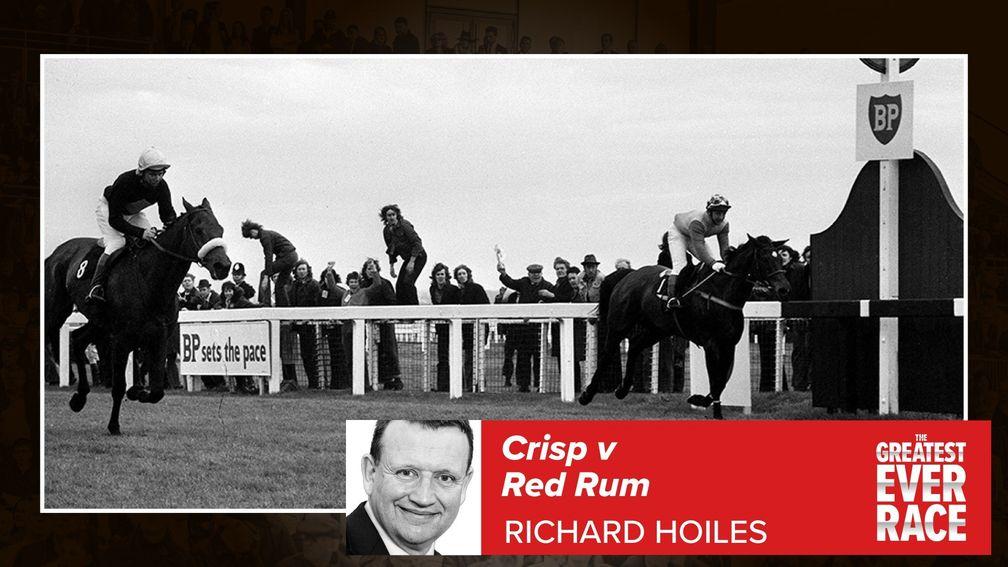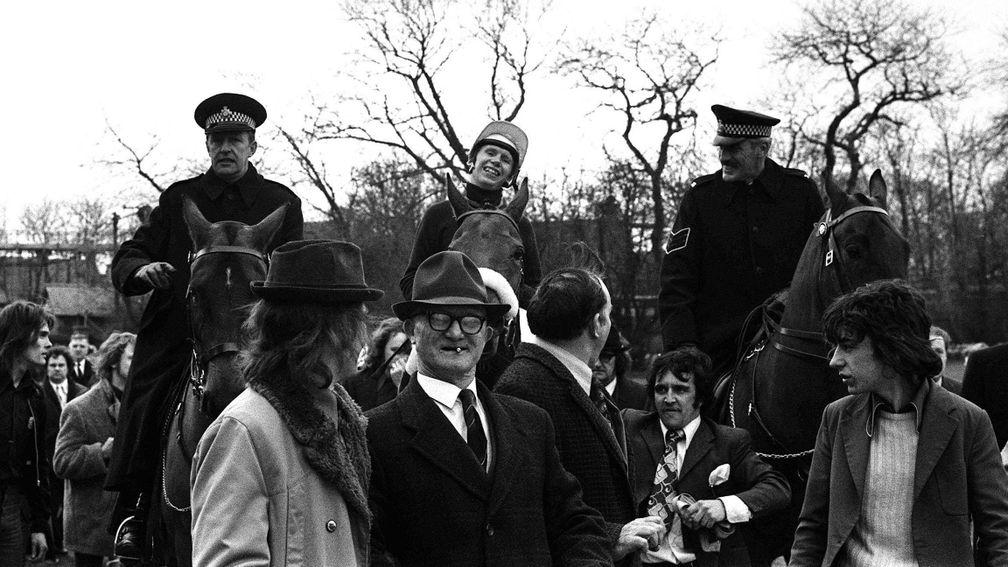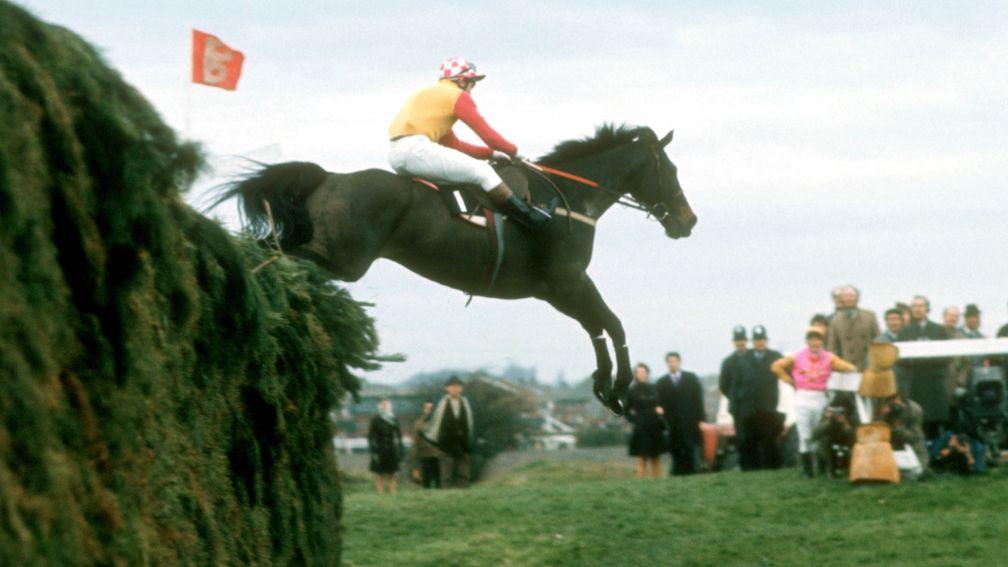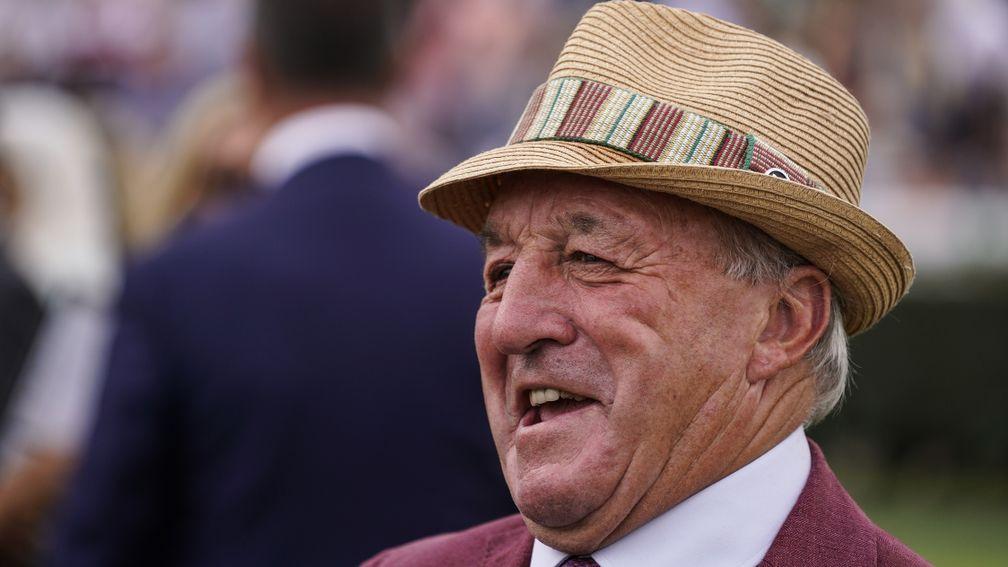'He might not have won - but 1973 will always be remembered as Crisp's National'

Voting has now closed for The Greatest Ever Race but you can still read our ten fantastic articles. Below, ITV Racing commentator Richard Hoiles nominates Red Rum v Crisp in the 1973 Grand National. The winner will be announced at racingpost.com at 6pm on Saturday, July 23.
The Grand National. The world's greatest steeplechase. The race where once-a-year punters dine out on their ability to select a winner which will remain etched in their memory for generations.
It will not take long in those reminiscences for the name Red Rum to crop up. The greatest Grand National horse of all time, trained behind a used car showroom and galloped on Southport beach by a trainer who moonlighted as a taxi driver to make ends meet. By the end of Rummy's Aintree exploits he would open betting shops and even appear on BBC Sports Personality of the Year, such was his celebrity status.
Yet when chat turns to the first of those victories in 1973, it is a race that is referred to not by his name but by the horse he narrowly beat that day. 1973 will always be remembered as Crisp's National.
Red Rum and Crisp lined up as joint-favourites for the race that day, yet the fact they ever met at all was remarkable in itself as they started worlds apart.

Red Rum's career was entwined with Aintree, from the day he made his debut as a two-year-old at the track in a seller to his death and burial by the side of the winning post. That juvenile debut (it was a mixed meeting in those days) was made just 24 hours before Foinavon's dramatic 1967 National victory and resulted in him sharing a dead-heat. He ran on National day itself a year later under Lester Piggott, in the year big-race winner Red Alligator was partnered by Brian Fletcher, the man who would ride Red Rum in the 1973 National.
Red Rum would run in five Nationals, winning three and finishing second twice. His third victory at the age of 12 was immortalised by the words of Sir Peter O'Sullevan: "It's hats off and a tremendous reception, you've never heard one like it at Liverpool – Red Rum wins the National."
By contrast, Crisp started out life in Australia. Having soon accounted easily for all the opposition that could be mustered, his owner Sir Chester Manifold set his sights on England and the Cheltenham Gold Cup.
When Crisp arrived at the Uplands stable of leading trainer Fred Winter, the first thing most who were in the yard at the time remember was his size – big, strong and imposing and certainly looking the part. The second was that he was almost impossible to clip, so his winter coat soon took hold to an alarmingly shaggy degree as he seemed impervious to any sedation to enable anyone with clippers anywhere near him.
The rules in those days stated that any horse coming in from abroad would automatically carry top weight to allow the handicapper a chance to assess their merits without being made to look foolish. Crisp duly carried top weight of 12st 7lb on his debut at Wincanton, where he went clear on the final circuit to win in impressive fashion.
For a big horse he had great rhythm, agility and speed. He began taking apart track records and breaking rivals' hearts with his front-running, bold-jumping style, and at the 1971 Cheltenham Festival he landed the Queen Mother Champion Chase in comprehensive fashion.
Crisp's attempts to realise his owner's Gold Cup dream, however, went far less smoothly. Up in trip, Crisp refused to settle and then, denied his customary front-running role, seemed to either lose the spark, fail to stay, or both.
No doubt eyebrows were therefore raised when he appeared in the entries for the 1973 National, where his high-class exploits earned him top weight of 12st, as opposed to the less-exposed Red Rum who was allocated just 10st 5lb. Having decided it was pointless trying to restrain and hence disappoint Crisp, the idea was for jockey Richard Pitman to allow Crisp his head initially but then try to settle him in front to preserve the crucial grains of energy needing to last the four and a half miles.
When the tapes rose, Crisp was right up with the leaders when he uncharacteristically pecked at the first. Far from being put off by the error, he seemed to relish this new challenge of the then fearsome obstacles. Pitman had decided his mount's jumping was such an asset that he would go up the inner, a route that with such big drops even angels declined to tread. It was also the shortest route, thus again maximising the chances of his mount lasting home.
Crisp was certainly happier out in front, but it soon became apparent that such was his enthusiasm any attempt at restraint was hopeless. He devoured the fences, leading from Grey Sombrero at a furious pace. When Grey Sombrero came down at the Chair, Crisp was left at least 15 lengths clear, and the lead was growing.
By Becher's on the final circuit, Crisp was out on his own. Pitman references the silence at this part of the race. There were no sounds of pursuers, no crashing of birch and fir, just an eerie quiet. So serene was it that the jockey could hear snippets of the commentary and, as they took Becher's, the voice of Michael O'Hehir over the racecourse speakers declaring that Red Rum was breaking clear of the pack behind.

The signature fences came and went, the Canal Turn and Valentine's, where David Nicholson, who had pulled up there a circuit before, shouted, "Kick on, you'll win." In truth, kicking on was the last thing on Pitman's mind; holding his mount together to conserve as much energy as possible was his growing concern.
Still there was no crack in Crisp's accurate jumping. Red Rum had himself now completely gone clear of the rest, and the 1973 Grand National was a duel. Watching it back even to this day, it remains enthralling: Red Rum's metronomic crocodile tick-tock advance gradually eroding Crisp's advantage – but surely still not quickly enough.
There is a long run between the third-last and second-last in the National and, perhaps without a next fence to focus on, Crisp began to tire ever so slightly. Pitman, for the first time, could hear a closing rival, but despite his flagging stamina Crisp's jumping remained true.
And then it happened. The moment that still haunts Pitman, who believes it cost him the race. After over four and a quarter miles of perfect rhythm, one crucial moment of discord.
Crisp was out on his feet and Pitman decided to give him a reminder. Yards from the sanctuary of the Elbow, where the left-hand running rail can guide an exhausted horse home, Pitman gave Crisp a wake-up call, but with his stick in the right hand. Crisp lugged left almost drunkenly, rhythm interrupted and now off course for the upcoming Elbow. That change of direction emptied Crisp and now Red Rum was closing fast. A split second before the red and white flash of the winning line there was instead a flash of maroon and yellow as Red Rum came by. Every time you watch the race back you are struck how close Crisp came to lasting home.
Red Rum stopped the clock a full 18 seconds faster than the great Golden Miller's course record. Those behind hardly ever mentioned in the race included L'Escargot, a dual Gold Cup winner and a horse who himself would beat Red Rum in the 1975 National; Spanish Steps, winner of the 1969 Hennessy and placed in a Gold Cup; and the controversially disqualified Whitbread winner Proud Tarquin.
A field of true quality taken apart in a duel for the ages. For Red Rum it marked the start of something special, but for Crisp it was beginning of the end. He beat Red Rum in a level-weights match at Doncaster the following season where speedier conditions were far more in his favour, but he then suffered an injury and never raced again.
The 1973 Grand National. Crisp's National. The greatest race of all time.
'It was a stupid thing to do and I hold my hands up'
Crisp's jockey Richard Pitman recalls his agonising defeat
I have been at Aintree on Grand National day since 1967 when I rode in Foinavon's race and have witnessed everything. There are so many Nationals that do not resonate but it is amazing that this one does, and it's the public who have kept it going.
I still get criticism to this day, but I don't care because everyone is entitled to an opinion and I know what was said between Fred Winter and myself before the race. We planned every single angle, and in the end we decided we'd make the running and try to slow the race down in order to try to get the trip with 12st.
I've said it before, but he was never running away with me. It's so unusual for a horse to see fences like the ones in the National and quicken into them from three or four strides away of their own volition, but he did as if to say: "Bring it on!"
He did make a mistake at the first, but he was a natural. Despite being a big, heavy horse, he never jumped high like a showjumper. He was almost galloping before he hit the ground – his legs were looking for the next stride and he wanted to get on with it. He was just a natural enthusiast.
To go out on the second circuit so alone without any noise was a marvellous moment. It was surreal, and I was loving it. I couldn't hear another horse but I could distinctly hear Michael O'Hehir's commentary going to Becher's saying, "Dick Pitman is 25 lengths clear of the pack," so I was quite aware of what was happening.
Crisp started to empty after the second-last and I could just start to hear Red Rum's hoofbeats because it was fast ground, but I still had a lead of 15 lengths or more.
You make lots of snap decisions and I think most of mine were correct, but picking up my whip before the Elbow was a stupid thing to do and I hold my hands up.

I shouldn't have used the whip at all. He was so big and so heavy that when you take your hand off one rein to give him a crack, you lose him. He fell away from me and, if I had just sat and pushed him out to the Elbow, then given him a crack when he had the running rail, fine, but you can't change it.
It was so close to the line when Brian Fletcher and Red Rum passed me. There was a feeling of desolation, but it soon turned to joy because the ride he had given me was an experience of a lifetime.
I don't think about it now because there's nothing I can do about it, but if someone brings it up I'm happy to speak and I can recall every step of the way. Everyone has an opinion and it's incredible that we're still talking about a race from 1973.
Don't miss the rest of this fantastic series here:
Sir Mark Prescott on Mandarin's miracle in the 1962 Grand Steeple-Chase de Paris
Brough Scott on Arkle v Mill House in the 1964 Cheltenham Gold Cup
Nick Luck on Secretariat's stunning win in the 1973 Belmont Stakes
Jessica Harrington on Grundy v Bustino in the 1975 King George
Chris Cook on Dawn Run's win in the 1986 Cheltenham Gold Cup
Rishi Persad on Dancing Brave's victory in the 1986 Prix de l'Arc de Triomphe
Lee Mottershead on Desert Orchid's win in the 1989 Cheltenham Gold Cup
Richard Forristal on Fantastic Light v Galileo in the 2001 Irish Champion Stakes
Patrick Mullins on Hardy Eustace v Harchibald in the 2005 Champion Hurdle

Stay ahead of the field with 50 per cent off the ultimate racing subscription. Enjoy the Racing Post digital newspaper and award-winning journalism from the best writers in racing. Plus, make informed betting decisions with our expert tips and form study tools. Head to the subscription page and select 'Get Ultimate Monthly', then enter the code WELCOME22 to get 50 per cent off your first three months. First three payments will be charged at £17.48, subscription renews at full monthly price thereafter. Customers wishing to cancel will need to contact us at least seven days before their subscription is due to renew.
Published on 1 July 2022inSeries
Last updated 12:53, 13 July 2022
- We believed Dancing Brave could fly - and then he took off to prove it
- 'Don't wind up bookmakers - you might feel clever but your accounts won't last'
- 'There wouldn't be a day I don't think about those boys and their families'
- 'You want a bit of noise, a bit of life - and you have to be fair to punters'
- 'I take flak and it frustrates me - but I'm not going to wreck another horse'
- We believed Dancing Brave could fly - and then he took off to prove it
- 'Don't wind up bookmakers - you might feel clever but your accounts won't last'
- 'There wouldn't be a day I don't think about those boys and their families'
- 'You want a bit of noise, a bit of life - and you have to be fair to punters'
- 'I take flak and it frustrates me - but I'm not going to wreck another horse'